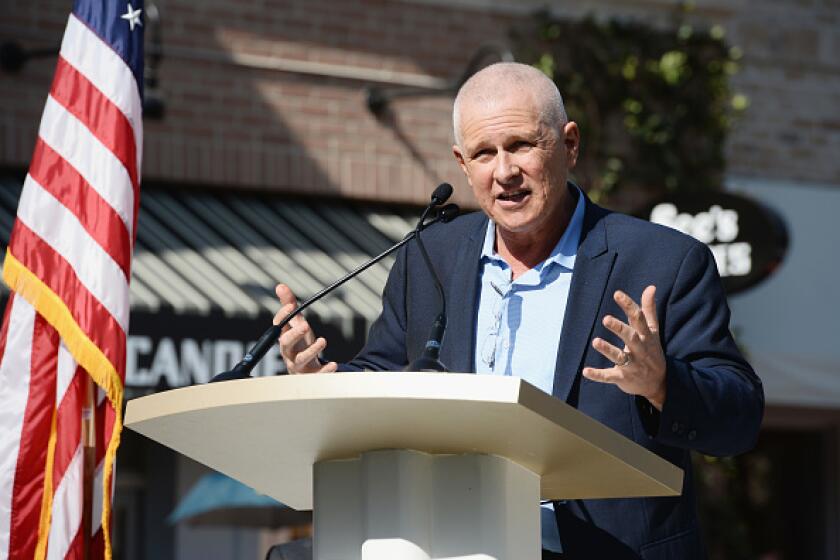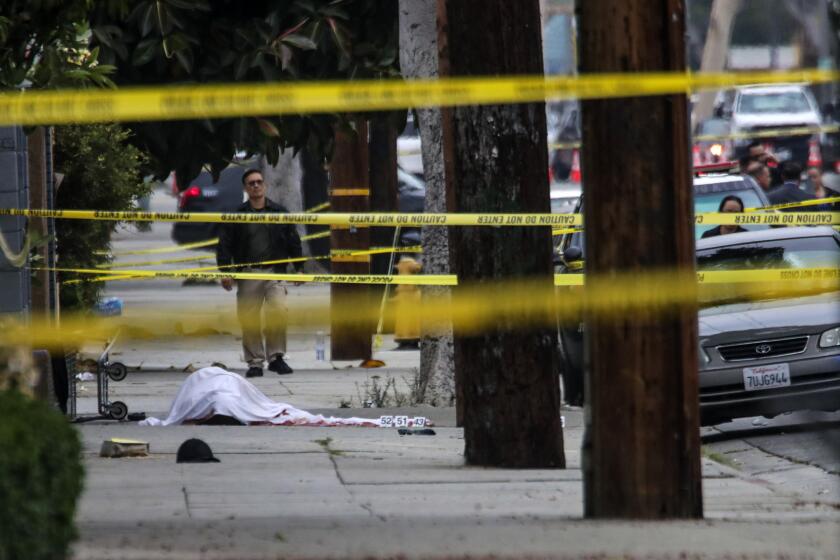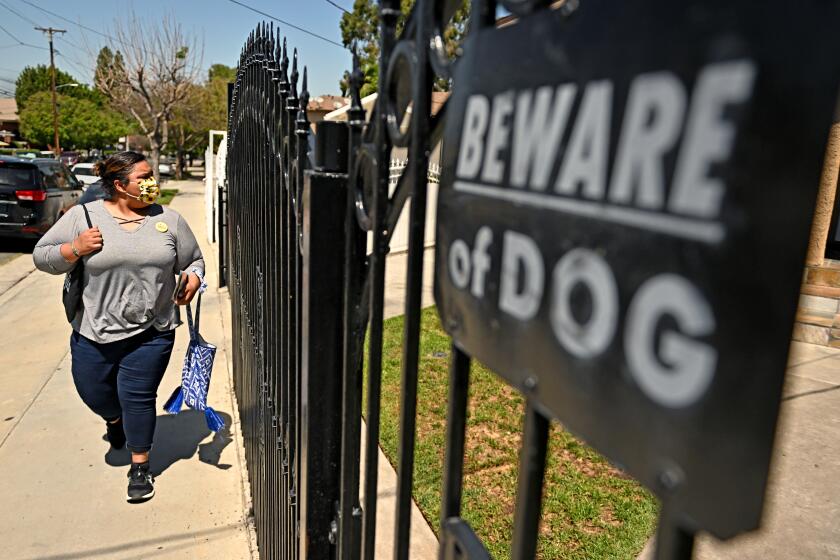Column: Why L.A., not San Francisco, could become the most progressive city in California
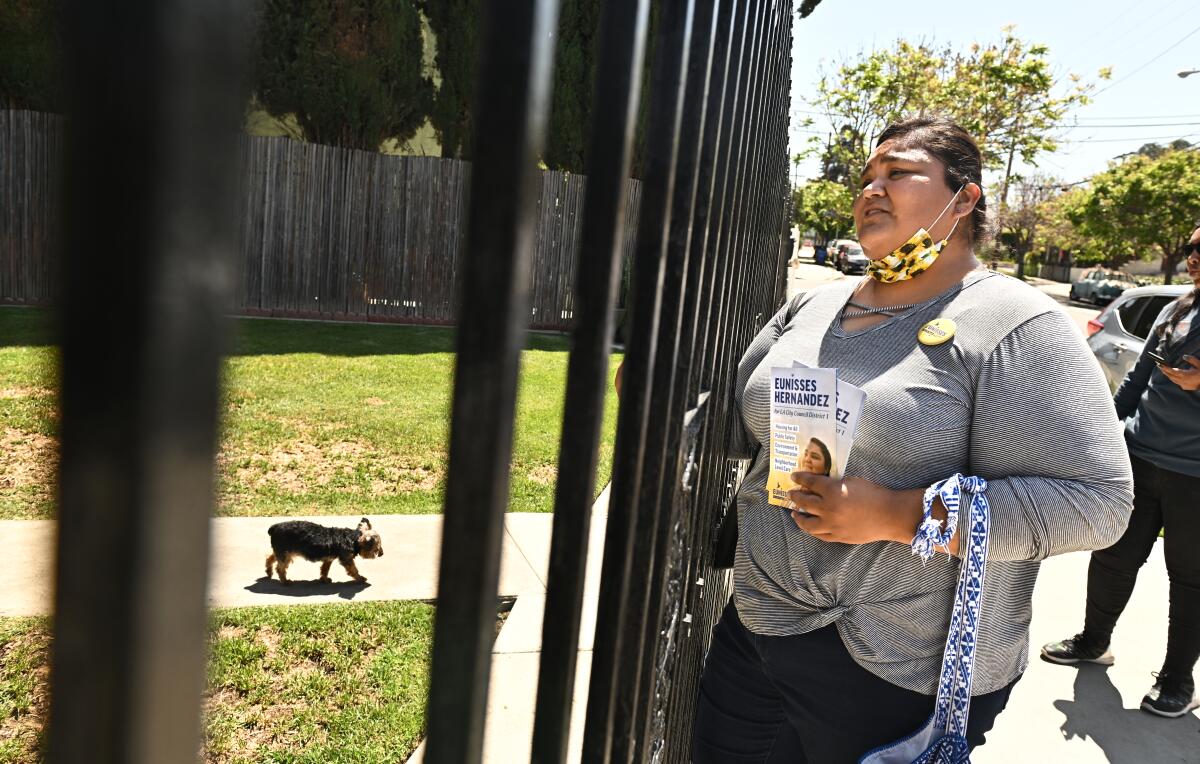
- Share via
In an election year supposedly defined by the public’s anxiety over rising crime and diminishing law enforcement, Los Angeles is on the verge of electing its first abolitionist City Council member.
Wrap your mind around that one.
It even took Eunisses Hernandez — the abolitionist in question — a little while to get over the shock of it. But by the time we spoke late last week, she seemed to understand what had happened in the Eastside race — and, more importantly, why it happened — better than most people.
It’s all part of what the 32-year-old community activist calls a “tidal wave of progressiveness” that’s washing over L.A.
On Friday, Hernandez turned what had been a narrow lead into a likely insurmountable one over incumbent City Councilman Gil Cedillo. In fact, she has already declared victory to represent District 1, which stretches from Highland Park through Elysian Park and Chinatown to Pico-Union. Cedillo has yet to concede.
A large number of left-of-center — and, in few cases, straight-up leftist — candidates have risen to first place as the L.A. ballot count continues.
Elsewhere on the Eastside, labor organizer Hugo Soto-Martinez, who campaigned on having fewer cops and repealing the law that allows the city to remove homeless encampments, has pulled ahead of incumbent City Councilman Mitch O’Farrell in District 13.
On the Westside, where voters in District 11 tried to recall Councilman Mike Bonin over the proliferation of tents in Venice, civil rights lawyer Erin Darling is in the lead, promising to address homelessness without criminalization and strengthen renter protections.
In citywide races, it’s much the same thing.
For controller, progressive activist Kenneth Mejia was the top vote-getter and faces City Councilman Paul Koretz in a runoff in November. For city attorney, civil rights lawyer Faisal Gill is in the lead after vowing to repeal the city’s anti-camping law and enact a pause on prosecutions to evaluate the “unacceptably broad” charging of misdemeanors.
And, in the mayoral race, Rep. Karen Bass has pulled ahead of billionaire developer Rick Caruso, with those who voted by mail overwhelmingly choosing her more liberal approach to addressing crime, policing and homelessness.
“This progressive surge has made itself competitive,” said Raphael Sonenshein, executive director of Cal State L.A.’s Pat Brown Institute for Public Affairs. “And that’s a big deal.”
The question is what this surge or tidal wave of progressiveness means for Los Angeles — if it means anything at all.
“Primaries are low visibility, but they really do reward organization because it’s generally a lower turnout, of course, than a general election,” Sonenshein said. “And if you have a well-organized group that’s out there pushing progressive issues, which there is this year, there are a number of organizations, they can really make a dent.”
Hernandez suspects something else is going on, though.
Something that’s the culmination of years of hard work by progressive activists to elect people willing to reimagine — or abolish — problematic government systems, such as policing. And, in that way, the primary election could mark the beginning of something far more permanent.
“I think the base of voters here in L.A. are more closer to the problems and the crises that are happening,” Hernandez told me. “And so many of them are aware of what better solutions are or what we can be doing differently. It’s what I found knocking on doors.”
::
Los Angeles is one of the most progressive cities in the country, but it’s rarely thought of as the most liberal city in the state.
That title usually goes to San Francisco.
“There is a perception of San Francisco as more liberal than L.A.,” Sonenshein said, “back to the days when L.A. was more conservative than it is today. I’m talking 30, 40, 50 years ago.”
Of course, these days, the reputation of the city by the bay, largely shaped during its pre-tech, counterculture years, has been taking a bit of an undeserved beating.
The same primary election that delivered Hernandez to office in L.A. removed progressive Chesa Boudin from office as San Francisco’s district attorney. Not “overwhelmingly,” as initially reported, but by a much closer margin of 55% to 45% by the time most of the ballots had rolled in.
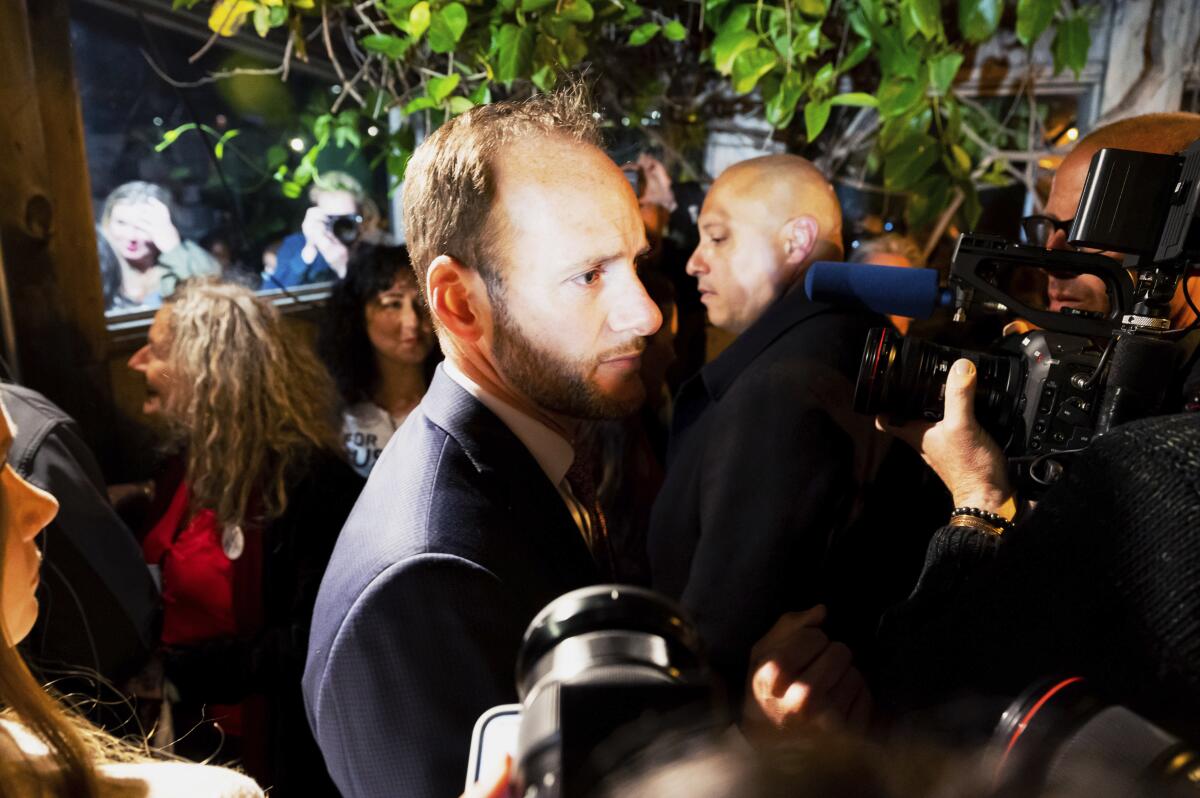
Nevertheless, given Boudin’s national profile, it was that vote that launched a thousand ill-thought-out think pieces and several more thousand speculative tweets. The assumptions were enough to prompt Mayor London Breed to set the record straight.
“This does not mean that criminal justice reform in San Francisco is going anywhere,” Breed said the morning after the primary election. “It’s a false choice to think that we have to give up on criminal justice reform or give up on police reform to focus on accountability.”
Yet, there are signs that progressive politics in the city, while certainly not receding, have in some ways topped out.
“People haven’t realized that L.A. has become a much more progressive city than it was,” Sonenshein explained, “and I don’t know that San Francisco has changed all that much.”
Contributing to this has been the influx of tech wealth, followed by the housing affordability crisis. San Francisco has become a far more affluent city than it once was and far less of a working-class one, with even teachers forced to become super commuters. And this has had an impact on diversity.
“Everybody’s seen ‘The Last Black Man in San Francisco,’” Melina Abdullah, a professor of pan-African studies at Cal State L.A., quipped about the 2019 film, the plot of which is exactly what it sounds like.
“You’re starting to see — I mean, maybe not even starting — what you’re seeing is people who we’d assume would be liberal have their class-based interests and are voting their class, rather than voting along with working-class people of color,” she added.
John Pfaff, a law professor at Fordham University, has studied this particular phenomenon when it comes to progressive prosecutors. He found that, across the U.S., support for such district attorneys and for criminal justice reform, in general, tends to be the strongest in counties with large percentages of Black residents.
Support for reform from white progressives tends to be unreliable over time, he said. We’ve seen it here in L.A., as some of the loudest voices for Black Lives Matter back in 2020 are now among the loudest pushing to recall L.A. County Dist. Atty. George Gascón.
“Crime is an abstraction for most of them — for most of us,” Pfaff told me. “You read about it, you hear about it, but the moment crime is closer to you, it’s kind of shocking and appalling. But the Black community, they not only experience the violence, they experience the policing. It’s not abstract for them. The fundamental humanization of it explains why there’s more support for reform.”
The man who shot and killed two El Monte police officers this week could have faced additional time in prison, but may have received a lighter sentence as a result of one of Los Angeles County Dist. Atty. George Gascon’s policies regarding ‘prior strike’ convictions. A judge later deemed the policy illegal.
That’s one more thing going for progressive politics in Los Angeles, which could make getting rid of Gascón harder than getting rid of Boudin in San Francisco.
While working-class people of color continue to be displaced from the city of L.A., many remain in the county, relocating to Palmdale and other, cheaper high desert locales. Those priced out of San Francisco generally have no choice but to leave the city and the county, as the boundaries are basically the same.
For that reason Abdullah says that even though housing costs are rising in Los Angeles, outstripping wages, she’s not too nervous — especially after the primary election.
“There is time for those who want a progressive agenda to make sure that we don’t go the way of San Francisco,” she said.
::
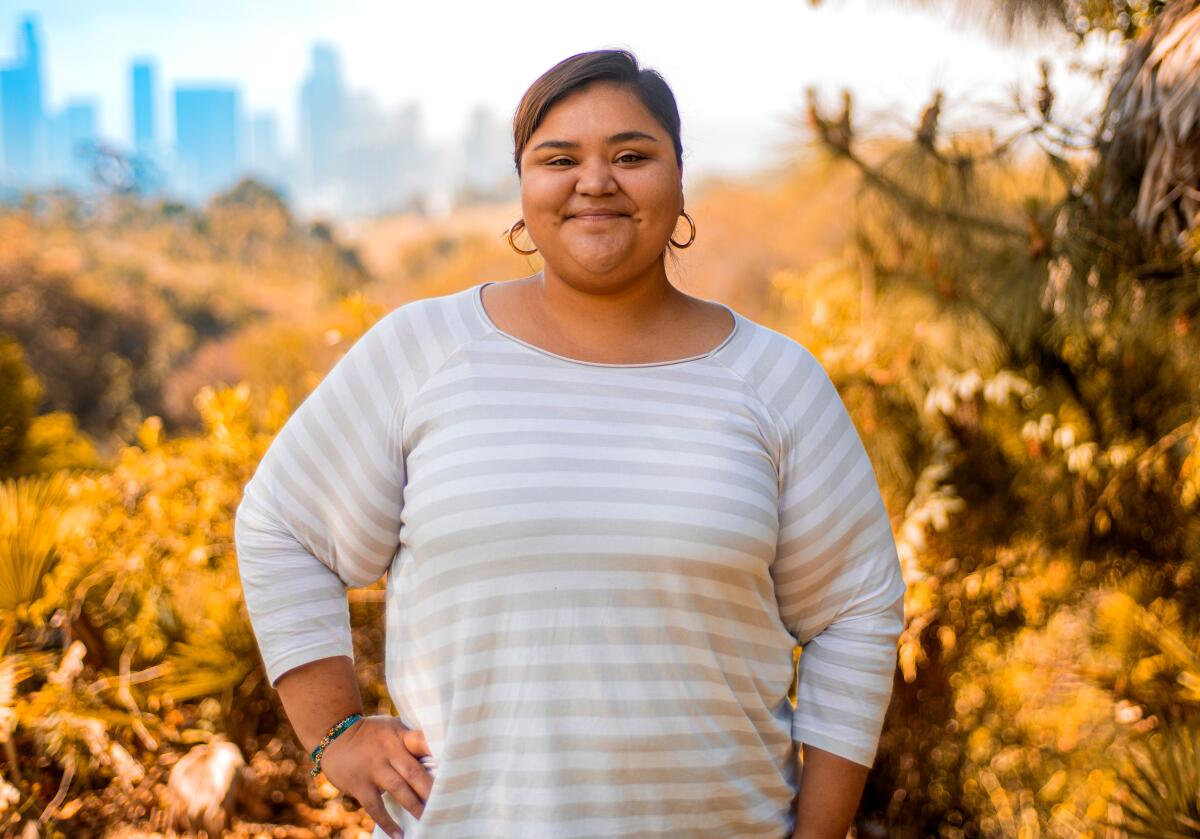
Hernandez’s journey to the forefront of progressive politics in Los Angeles was a circuitous one.
The daughter of immigrants and a lifelong resident of Highland Park, she lives in the same house her mom bought decades ago — and that they’re still paying off. She laments the gentrification that has changed the neighborhood at a time when the median income in District 1 is about $35,000.
“I’ve seen homes next to mine that were selling for $1.3 million,” Hernandez told me. “I’ve seen the investment and the development, but also the displacement that has come with it.”
That turned her into a believer in blocking as much market-rate housing development as possible, and instead pushing for stronger renter protections and land trusts to increase the stock of affordable housing.
Growing up, Hernandez also said, she saw friends and family members “impacted by criminalization” because of the lack of mental health services, drug addiction treatment and just poverty.
“I was going to be a cop,” she said. “I thought that I could have been the cop that wouldn’t have arrested my friend for selling weed. That conviction ruined his life.”
Councilman Gil Cedillo faces a major challenge from activist Eunisses Hernandez, in a race focused on housing prices and calls to eliminate police.
It was a college course that explored the systemic forces behind the war on drugs that helped turn her into a community activist and an abolitionist. She joined the Drug Policy Alliance, and worked on passing and implementing a number of state-level criminal justice reform measures, including Proposition 47.
Today, she is perhaps best known for co-founding La Defensa, a group that advocates for alternatives to criminalization and incarceration and for electing progressive judges. As executive director, she was an architect of Measure J, which voters approved in 2020 and prompted L.A. County to invest $100 million in community services, including youth programs.
Now Hernandez, the once-aspiring cop, has set her sights on chipping away at the power that “harmful departments” have over Angelenos, including but not exclusive to the LAPD.
“People think abolition is like no cops and that’s it. But we have to be more strategic,” she explained. “You actually have to build the responses that you want to see. It is about not replacing one harmful thing with another. It is about replacing one harmful system with something that’s actually more supportive.”
Hernandez paused, casting about for the right words.
”It’s about values,” she said at last. “It’s a framework for the system.”
More to Read
Sign up for Essential California
The most important California stories and recommendations in your inbox every morning.
You may occasionally receive promotional content from the Los Angeles Times.
